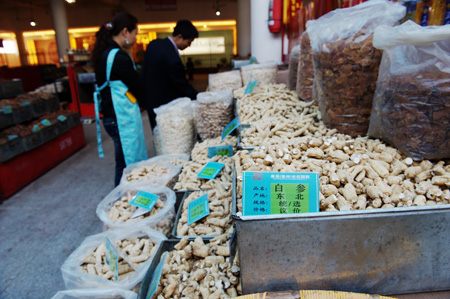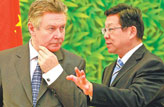Economy
TCM ingredient vendors ordered to reduce stockpiles
Updated: 2011-07-19 10:06
By Wei Tian (China Daily)
|
 |
|
A traditional Chinese medicine (TCM) ingredient market in Haozhou, Anhui province. The prices of more than 80 percent of 537 TCM ingredients have risen year-on-year, recording an average increase of 109 percent. [Photo / China Daily] |
BEIJING - Authorities have told traditional Chinese medicine (TCM) ingredient vendors and distributors to unload their stockpiles within designated time limits in order to cool surging prices.
Fifty-four companies were ordered to unload a total of 1,000 tons of pilose asiabell root, an important TCM ingredient, to authorized pharmaceutical companies by the end of the year, the National Development and Reform Commission (NDRC) website said on Monday.
Among them, 10 companies, which have been stockpiling ingredients since last year, were told to unload 200 tons for no more than 60 yuan ($9.28) a kilogram within three days, or before July 21. Those that fail to do so will face administrative sanctions.
The mandate was made following a joint investigation by the NDRC and other government bureaus into more than 20 TCM ingredient warehouses in Longxi, Gansu province, which is responsible for the majority of pilose asiabell root production in China, in a bid to stop hoarding and speculation.
According to statistics by the China Association of Traditional Chinese Medicine (CATCM), the prices of more than 80 percent of 537 TCM ingredients have increased year-on-year, recording an average rise of 109 percent.
The price of pilose asiabell root, or danshen in Chinese, has risen more than tenfold in the past two years - from 9 yuan a kilogram in August 2009 to more than 90 yuan a kilogram in June 2011.
Although speculative investment appears to be responsible for the rapid appreciation, the surging prices of TCM ingredients are actually a result of multiple factors, said Zhou Lei, director of the market committee of the CATCM.
"The demand for many ingredients is being pushed up by increasing consumption," Zhou said, explaining that some ingredients are also key components of consumer health products.
"The rising cost of labor is another reason. Harvest workers used to receive 30 yuan a day, but now no one will do it for less than 100 yuan a day," said Zhou, who took part in the investigation in Gansu province.
"Hoping to cash in on the rising value, many growers are also hoarding their harvests," he said.
Zhou considered small price increases to be inevitable, but prices can be brought back to reasonable levels if market information becomes more accessible.
He cited the example of the price fluctuation of pseudoginseng, another important TCM ingredient. The price fell to 200 yuan a kilogram from a peak of 600 yuan in March after speculators responded to demand and sold their supplies, Zhou said.
"After all, they can still make decent profits even if the products are sold at a lower price," he added.

Specials

China-US Governors Forum
The first China-US Governors Forum is held July 15 in the Salt Lake City, the United States.

My China story
Foreign readers are invited to share your China stories.

Rare earths export quota
China kept its export quota at almost the same level as last year.